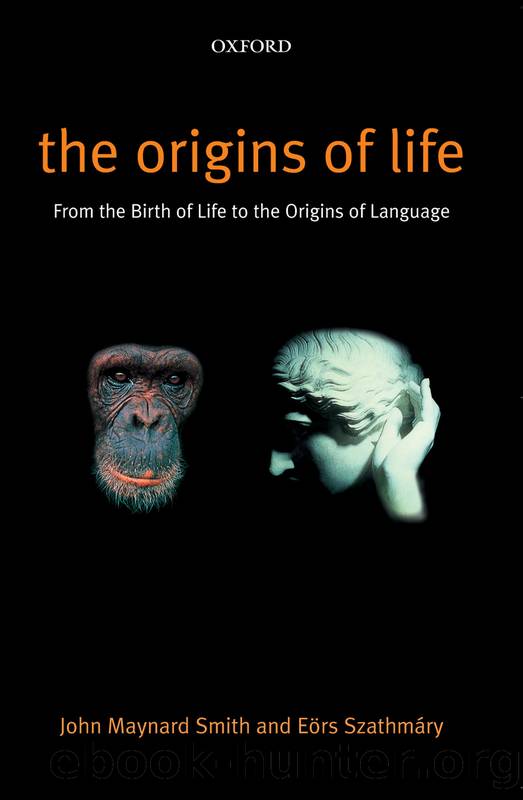The Origins of Life by Szathmary Eors; Maynard Smith John; & Eörs Szathmáry

Author:Szathmary, Eors; Maynard Smith, John; & Eörs Szathmáry
Language: eng
Format: epub
Publisher: Oxford University Press, Incorporated
Published: 2011-03-14T16:00:00+00:00
Mating types and sexual differentiation
Almost all sexual protists have two âmating typesâ, + and â99999. Gametes of the + type will fuse only with â, and vice versa. This has the effect that a gamete will not fuse with another too similar to itself. This is easy to understand. If, as we suggested, the function of gamete fusion is to confer hybrid vigour, fusion of identical gametes, and in particular of gametes that have just arisen by the meiotic division of a single cell, should be avoided. But it is at first sight puzzling that there are just two mating types. Why not many types, any one of which could fuse with any other? This would increase the proportion of gametes with which any particular gamete could fuse. To digress for a moment: something like this happens in flowering plants. Most are hermaphrodite, producing both seeds and pollen, but are self-incompatible: that is, they cannot pollinate themselves. Usually there are many self-incompatible types, and pollen from any one of them can pollinate any of the others. This is just what one would expect. So why only two mating types?
A possible answer is that it is easier to devise a system with two mating types than with many, but evolution is not usually so uninventive. Whatever may have been the case in the first sexual organismsâand two mating types may well be primitiveâtoday the explanation seems to be that mitochondria, and chloroplasts if they are present, are inherited from one parent only. For example, in the well-studied green alga, Chlamydomonas, mitochondria are inherited only from the â mating type and chloroplasts only from the + type. This rule of uniparental inheritance of intracellular organelles is almost universal. In animals, mitochondria are maternally inherited. In plants, chloroplasts are usually transmitted in the ovule, not the pollen, but there are exceptions: in conifers, chloroplasts are transmitted in the pollen. It is therefore not surprising that, unlike flowering plants but like mammals, conifers are never parthenogeneticâanother example of the difficulty of reverting from sex to parthenogenesis.
Why should uniparental inheritance of organelles be so nearly universal? The likely answer is that, if mitochondria, say, were inherited from both parents, the stage would be set for the evolution of âselfishâ organelles. At cell division, mitochondria are randomly passed to the two daughter cells: there is no device ensuring that one copy of each mitochondrion passes to each daughter cell, as is the case for chromosomes. Therefore a mitochondrion that multiplied more rapidly within the cell, but which was less effective in making ATP, would spread through the population. Such mitochondrial mutants do occur, but because of uniparental inheritance they cannot spread, although they may kill the cell they are in.
Given the need for uniparental inheritance of organelles, it is hard to evolve more than two mating types, one that provides the organelle and the other that does not. In 1992, Laurence Hurst and William Hamilton published a remarkable set of observations showing that this is indeed the right explanation.
Download
This site does not store any files on its server. We only index and link to content provided by other sites. Please contact the content providers to delete copyright contents if any and email us, we'll remove relevant links or contents immediately.
Sapiens: A Brief History of Humankind by Yuval Noah Harari(13981)
Sapiens by Yuval Noah Harari(5117)
Homo Deus: A Brief History of Tomorrow by Yuval Noah Harari(4682)
Pale Blue Dot by Carl Sagan(4613)
Livewired by David Eagleman(3531)
Origin Story: A Big History of Everything by David Christian(3470)
Brief Answers to the Big Questions by Stephen Hawking(3239)
Inferior by Angela Saini(3146)
Origin Story by David Christian(2990)
The Gene: An Intimate History by Siddhartha Mukherjee(2925)
Signature in the Cell: DNA and the Evidence for Intelligent Design by Stephen C. Meyer(2875)
The Evolution of Beauty by Richard O. Prum(2867)
Aliens by Jim Al-Khalili(2703)
How The Mind Works by Steven Pinker(2611)
A Short History of Nearly Everything by Bryson Bill(2503)
Sex at Dawn: The Prehistoric Origins of Modern Sexuality by Ryan Christopher(2410)
From Bacteria to Bach and Back by Daniel C. Dennett(2388)
Endless Forms Most Beautiful by Sean B. Carroll(2349)
Who We Are and How We Got Here by David Reich(2341)
